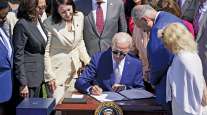Maryland Bill to Restore Highway User Revenue Poised to Become Law

After years of calling to restore highway user revenue, transportation advocates may see the funding return by fiscal 2020.
House Bill 807 passed the General Assembly on April 2. It requires all revenue collected from the gas tax to be held in the Transportation Trust Fund beginning in fiscal 2020.
Lawmakers in 2010 dipped into that pool to help balance the general fund. Highway user revenue funding declined sharply in the wake of the 2007 recession as the state struggled to meet expenses. That year, Frederick County received around $13.8 million. By comparison, Republican Gov. Larry Hogan’s most recent budget proposal included $2.2 million in highway user revenue for the county.
RELATED: Opinion - Trump plan unlikely to spur promised $1 trillion in infrastructure investment
Local municipal leaders have called to restore the funding over the past decade. Frederick Mayor Michael O’Connor, who was an alderman during the belt-tightening years, said he was pleased that it appeared the money would return to local governments. He added, however, that it still wouldn’t be enough to catch up on needed repairs, judging by an evaluation of city streets about five years ago.
“Anything that stabilizes the highway user revenues as a reliable funding source for the projects it’s intended to do is welcome news for the city,” O’Connor said, adding later, “It lets us do more than we’ve been able to do.”
If the bill is signed into law, the Maryland Department of Transportation would change the way it allocates the funds.
Instead of sharing revenue directly with local governments, MDOT would provide capital grants based on the amount of revenue in the highway user revenue fund being allocated to the jurisdiction.
The bill also increases municipalities’ share of highway user revenue to 2.8% of the fund by 2021. The current allocation leaves the Maryland Department of Transportation with 90.4% of the revenue and municipalities with 0.4%. Baltimore city, which maintains all the roads and highways in its jurisdiction, would increase its share from 7.7% to 8.9% if the bill were to become law. Counties would maintain a 1.5% share.
The Consolidated Transportation Program for fiscal 2019 through 2023 set aside around $58 million in fiscal 2019 for local government transportation capital grants: $29.9 million goes to counties, $5.6 million goes to Baltimore city and $22.5 million goes to municipalities.
The Department of Legislative Services estimated that Transportation Trust Fund revenue would decrease by about $72.7 million in fiscal 2020. Revenue available to MDOT decreases by $641.8 million over the five-year period starting in fiscal 2019 when combined with a decrease in bond issuances and debt service savings.
Distributed by Tribune Content Agency, LLC




